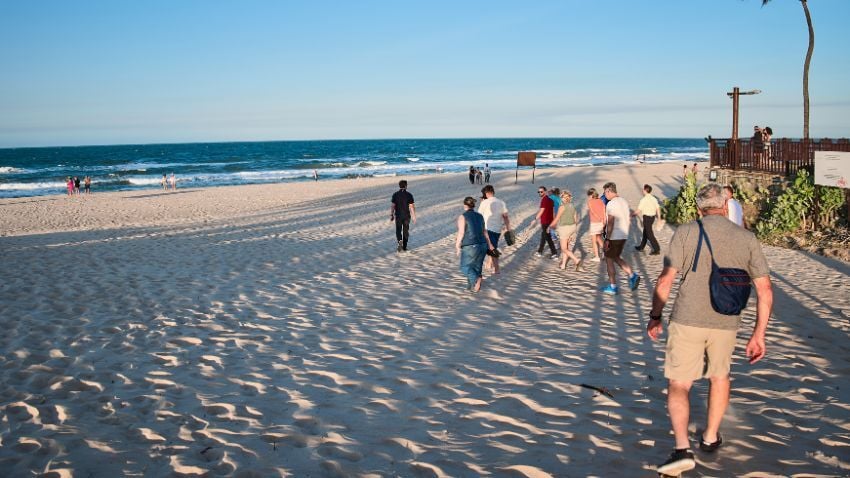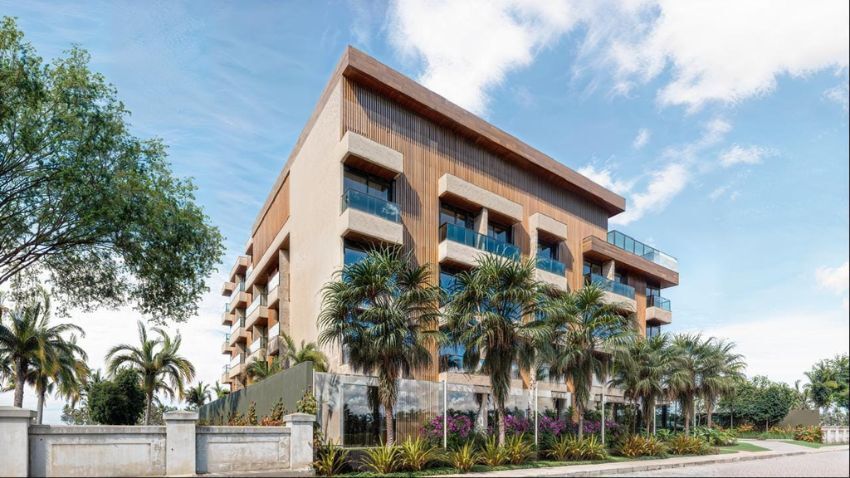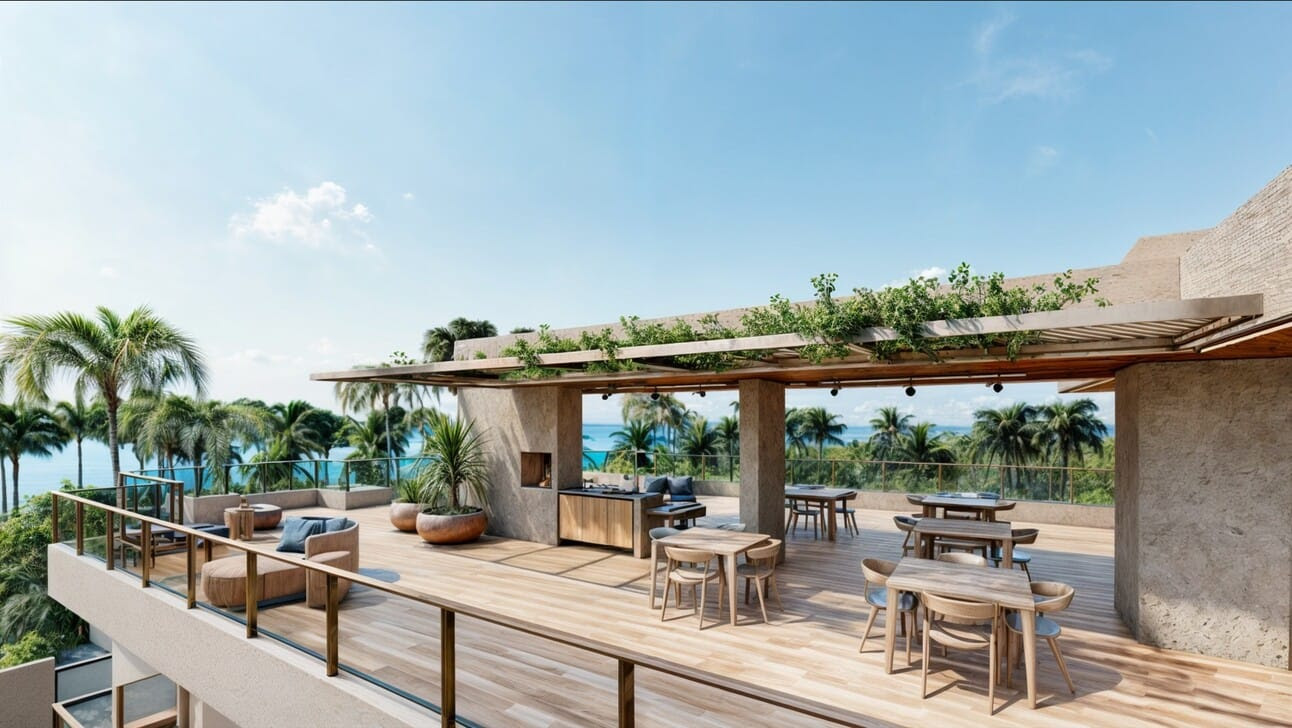Why I Own Real Estate in Multiple Countries...
Over the years, I’ve built a portfolio of real estate across numerous countries - not just as investments but as strategic tools to ensure freedom,...
10 min read
 Team Brazil Beachfront
:
July 12, 2024
Team Brazil Beachfront
:
July 12, 2024

As you explore the landscape of Brazil's economic growth, you'll find a country ripe with investment opportunities, yet tinged with complexities that demand a thorough understanding. From the booming tech sector to the robust agricultural exports, Brazil offers a palette of opportunities that could greatly enhance your investment portfolio. However, understanding the terrain requires a detailed exploration of its historical economic patterns, current market trends, and the ever-changing political climate. Equipped with the right knowledge, you stand to not only mitigate potential risks but also to capitalize on the growth prospects of Latin America's largest economy. Let's explore what makes Brazil an intriguing option for investors and how you can position yourself to benefit.

While Brazil's economy presents a complex landscape, it's essential for investors to understand its key dynamics and potential for growth. As you explore its economic structure, you'll find it's the largest in South America, fueled by vast natural resources and a diverse industrial base. However, it's not without its challenges, including political instability and fluctuating commodity prices, which can impact overall economic health.
You should also consider Brazil's role in international trade. It's a major player on the global stage, exporting everything from soybeans to aircraft. This external sector plays a vital role in influencing the economy's performance, making it important to watch global market trends and trade agreements.
Inflation and exchange rates are other critical factors. Brazil has historically battled high inflation, although recent measures have aimed to stabilize it. The exchange rate can be volatile, affecting your investment's value in your home currency. Staying informed about these economic indicators can help you mitigate risks and spot opportunities.
Understanding Brazil's economic overview requires looking at these components and how they interact. It's a market with considerable potential for those who navigate its complexities wisely.
Exploring Brazil's burgeoning economy, it's crucial to concentrate on the key growth sectors that offer lucrative opportunities. Agriculture stands out as a powerhouse, with Brazil being a leading exporter of soybeans, sugar, and coffee. This sector's resilience and global demand make it an attractive option for investors looking to capitalize on commodities.
Another sector to watch is technology. Brazil's tech industry is on the rise, with significant advancements in fintech, e-commerce, and startups. This growth reflects a shift towards digitalization and innovation, presenting a promising avenue for tech-savvy investors.
The energy sector, particularly renewable energy, is also pivotal. With an abundance of natural resources, Brazil is expanding its renewable energy capacity, focusing on wind and solar power. This aligns with global trends towards sustainability and offers opportunities for investment in green technology.
Lastly, the real estate market in Brazil is rebounding, driven by urbanization and an improving economic climate. Investing in residential or commercial properties could yield substantial returns as the sector continues to recover and grow.
Focusing on these sectors can help you tailor your investment strategy to leverage Brazil's economic momentum.

To understand Brazil's economic trajectory, you need to look at its early economic foundations, recent growth trends, and the mix of challenges and opportunities it faces.
This approach gives you a clear picture of how past events shape current economic conditions and future prospects.
Let's explore these aspects to gauge the investment landscape in Brazil more accurately.
Understanding Brazil's economic history is essential for investors analyzing its growth potential. Initially, you'll discover that Brazil's economy was heavily reliant on agriculture, particularly sugar and coffee plantations, during the colonial period up to the 19th century. This reliance created a foundation that was both strong in natural resources but also vulnerable to fluctuations in global commodity prices.
As you explore further, you'll see how the discovery of gold and other minerals in the 18th century began to diversify the economy, albeit slowly. However, it wasn't until the 20th century that Brazil started to industrialize, reducing its dependence on agriculture. This shift laid the groundwork for the complex economy you're looking at today, marked by a mix of agriculture, mining, manufacturing, and services.
In recent years, Brazil's economic landscape has seen significant shifts, driven by a combination of domestic policies and global market dynamics. You've likely noticed the rollercoaster of its GDP growth, marked by vigorous expansions and occasional setbacks.
The commodity boom, playing a pivotal role, has buoyed the economy, making it an attractive spot for investors eyeing sectors like agriculture, mining, and energy. Additionally, Brazil's push towards modernization and infrastructure development has spurred growth, enhancing its competitiveness on the global stage.
Yet, it's not just about natural resources and construction; technology and innovation have started to carve out significant niches, contributing to a more diversified economic base. This evolution reflects Brazil's resilience and its adaptability to changing economic tides.
Analyzing Brazil's economic journey reveals a landscape of both hurdles and prospects shaping investment potentials. You'll find that political instability and corruption have historically dampened growth, deterring foreign investment.
Additionally, infrastructure deficiencies and bureaucratic red tape further complicate business operations, affecting overall economic vitality. Yet, it's not all gloomy. Brazil's rich natural resources, including vast arable lands and significant reserves of minerals and fresh water, present substantial opportunities.
The country's burgeoning tech sector and expanding middle class signal robust markets for domestic and international investors alike. Leveraging these assets while addressing the challenges requires astute strategy and patience.
As you consider investing in Brazil, weigh these factors carefully to harness the full potential of its economic landscape.

As you navigate Brazil's economic terrain, understanding the investment landscape is essential.
You'll explore the market opportunities that have emerged, assess the risks involved, and get a clear overview of the regulatory environment.
This knowledge is indispensable for making informed decisions in Brazil's dynamic economy.
Brazil's vibrant economic landscape reveals numerous investment opportunities across various sectors. You'll find emerging tech startups thriving alongside robust agricultural industries, creating a dynamic environment ripe for investment.
The country's push towards renewable energy sources has opened up new avenues for green investments, particularly in solar and wind energy projects. Moreover, Brazil's vast natural resources, including minerals and forestry, offer solid prospects for sustainable exploitation and exportation.
In the urban centers, real estate and infrastructure development are booming, driven by growing urban populations and increased domestic consumption. Additionally, the government's favorable policies towards foreign investment have streamlined the entry process, making it easier for you to capitalize on these opportunities.
With a keen eye, you can navigate Brazil's diverse economy to uncover profitable ventures.
While exploring investment opportunities in Brazil offers promising returns, it's important to weigh the inherent risks that could impact your portfolio.
Economic volatility is a significant factor, with Brazil's history of inflation and currency fluctuations potentially affecting investments. Additionally, political instability can lead to sudden changes in policy that might harm the business environment and investor confidence.
You'll also face competition risks from both local and international companies, making market entry and expansion challenging. Moreover, infrastructure issues, including logistics and energy reliability, could affect operational costs and efficiency.
It's vital to conduct thorough due diligence and consider these factors when planning your investment strategy in Brazil, ensuring you're prepared for the ups and downs of the market.
Understanding Brazil's regulatory environment is essential for investors aiming to tap into the country's economic potential. You'll find a complex framework, marked by both federal and local regulations. It's important to navigate this landscape with care, as it directly influences your investment's feasibility and growth prospects.
Brazil has been working towards streamlining procedures and improving the business climate, yet you should still prepare for bureaucracy and potential delays. Considering sectors like energy, agriculture, and technology, regulations can vary greatly, thus demanding specialized knowledge. Partnering with local experts can provide invaluable insights and facilitate compliance.
Additionally, staying updated on regulatory changes is key, as Brazil continues to reform its policies to attract more foreign investment and boost economic activities.

Government policies play a pivotal role in shaping Brazil's economic growth, directly influencing investor confidence and market dynamics. As you explore the Brazilian market, understanding the nuances of these policies is essential. The government's commitment to fiscal responsibility, for example, reassures you that inflation and debt levels are kept in check, fostering a stable economic environment.
You'll also notice the emphasis on infrastructure development. Investments in transportation, energy, and digital infrastructure not only improve efficiency but open up new opportunities for businesses. This proactive approach can greatly reduce operational costs and enhance competitiveness, making Brazil an attractive destination for your investments.
Moreover, Brazil's trade policies are designed to integrate its economy into the global market. By negotiating trade agreements and reducing trade barriers, the government aims to boost exports and attract foreign investment. This global outlook ensures that you're investing in a market that's not just looking inward but is actively engaging with the world.
Tax reforms, aimed at simplifying the complex tax system, can't be overlooked either. While still a work in progress, these reforms promise to ease the tax burden on businesses, improving the overall investment climate. For you, this means exploring the market becomes less burdensome, allowing more room for growth and profitability.
Despite the promising landscape, you'll encounter several challenges and risks that could impact your investment decisions in Brazil. The country's complex regulatory environment can be a major hurdle. Maneuvering through Brazil's bureaucratic red tape requires patience and careful planning. You'll also face the perennial issue of corruption, which, despite efforts to combat it, remains a significant concern affecting both public and private sectors.
Another risk is Brazil's economic volatility. The country's history of fluctuating commodity prices, inflation, and currency devaluation can affect the stability and predictability of your investments. You're also likely to encounter infrastructure challenges, including inadequate transportation and energy systems, which can hamper business operations and logistics.
Moreover, Brazil's political landscape is marked by instability and unpredictability, which can lead to sudden changes in policy and regulation. Such shifts can create an environment of uncertainty for investors. Additionally, the country's reliance on commodity exports makes it vulnerable to global market fluctuations, which could adversely affect your investment's performance.
Tackling these challenges requires thorough research, a well-considered strategy, and possibly local partnerships. Understanding these risks is essential for making informed decisions and maximizing the potential of your investments in Brazil.

What do future growth projections reveal about Brazil's economic landscape, and how might these trends affect your investment decisions?
Analysts are forecasting a moderate yet steady growth trajectory for Brazil in the coming years. You'll find that after steering through turbulent economic waters, Brazil is on a path to recovery, bolstered by its vast natural resources and a burgeoning tech sector. However, it's not all smooth sailing. The pace of growth is expected to be tempered by structural challenges, including labor market rigidities and a complex tax system.
For you as an investor, these projections suggest a cautious optimism. Brazil's economy is diversifying, and while traditional sectors like agriculture and mining continue to thrive, technology and renewable energy are emerging as new engines of growth. This diversification could mitigate some risks associated with your investments.
Yet, you must stay alert to the vulnerabilities in Brazil's economy, such as its reliance on commodity prices and political instability, which could sway economic outcomes. Keeping a close eye on policy developments and market trends will be essential in maneuvering the investment landscape in Brazil. As you look ahead, balancing your portfolio to include a mix of sectors may help capitalize on Brazil's growth while managing potential risks.
Given the moderate yet steady growth projections for Brazil's economy, let's explore the opportunities this opens up for investors.
You'll find Brazil's burgeoning tech sector ripe for investment, with startups in fintech, agtech, and e-commerce showing robust growth. The government's increasing support for innovation means you're looking at a fertile ground for venture capital investments. Additionally, Brazil's vast natural resources, including agriculture, mining, and energy, offer solid prospects for those interested in commodities and sustainable investments. The country's commitment to renewable energy, particularly biofuels and hydroelectric power, presents unique opportunities in the green economy.
Real estate is another area where you might see significant returns. Urban development projects, driven by the growing middle class, are popping up across major cities. With Brazil's tourism industry poised for a comeback, hospitality and commercial real estate in tourist hotspots could yield considerable benefits.
Lastly, Brazil's infrastructure sector, set for major upgrades and expansions, offers long-term investment opportunities. The government's focus on improving transportation and logistics infrastructure signals lucrative contracts and partnerships for international investors.
In essence, Brazil's economic landscape is dotted with opportunities across various sectors, promising attractive returns for those who navigate it wisely.

As you consider investing in Brazil's diverse economy, it's important to understand the factors that influence its market dynamics. Brazil's economic landscape is vibrant but comes with its unique set of challenges and opportunities. Here's what you need to keep in mind:
Navigating Brazil's economy requires a strategic approach. You'll need to be well-informed, patient, and flexible to successfully capitalize on the opportunities while mitigating risks. With the right strategy, Brazil's market can offer rewarding prospects for savvy investors.
You're probably wondering how Brazil's minimum wage impacts its economy.
Well, it's a key factor in boosting consumer spending since it increases the purchasing power of millions. However, it can also pressure businesses, especially small ones, by raising labor costs.
This balance affects overall economic growth, influencing inflation and potentially leading to adjustments in monetary policy.
Remittances play an important role in Brazil's economy, contributing significantly to its GDP. In fact, in recent years, they've accounted for over 0.2% of the country's GDP.
That mightn't sound like much, but it translates into billions of dollars flowing into Brazil, helping to boost consumer spending and support families. These funds are often used for daily expenses, education, and health care, underlining their importance in the broader economic landscape.
You're wondering how Brazil's climate affects its agriculture, right?
Well, Brazil's diverse climate allows it to be a major player in agriculture. It's why they're leading exporters of coffee, soybeans, and sugar.
However, this same climate poses risks, like droughts and floods, impacting crop yields.
You're probably wondering about Brazil's major export commodities. Well, it's fascinating! Brazil is a powerhouse in exporting soybeans, iron ore, and crude petroleum, leading the charge globally. They've also made their mark with sugar cane, coffee, and beef.
These exports play a vital role in shaping their economy, driving growth, and attracting investors worldwide. So, if you're eyeing international trade, keeping an eye on Brazil's export trends is a smart move.
Brazil's population growth notably impacts its economy, shaping demand and labor markets. With over 210 million people, it's a bustling hub that fuels consumer demand and workforce expansion.
This demographic trend drives economic diversification, influencing sectors from agriculture to technology. As the population grows, so does the need for infrastructure, education, and healthcare, creating a ripple effect that boosts economic activity.
You'll find this growth sparks opportunities and challenges in equal measure.
So, you've danced through Brazil's economic carnival, twirling between growth sectors and dodging the occasional pothole of political instability.
You've sambaed past the regulatory environment, tangoed with government policies, and cha-chaed through investment opportunities.
Ready to take the plunge? Just remember, maneuvering Brazil's economy is like a capoeira match — it requires agility, insight, and a good sense of rhythm.
Invest wisely, or you might just find yourself in an economic dance-off without the right moves.


Brazil Beachfront is your trusted source for uncovering the incredible opportunities along Brazil’s breathtaking Northeastern coastline. With Brazil’s economy on the rise and its middle class growing rapidly, the market offers an undeniable upside for offshore investors.
The newsletter also showcases past projects, providing readers who have purchased real estate with detailed construction updates to keep them informed every step of the way. From the lifestyle appeal of Brazil’s pristine beaches to the financial advantages of investing in this high-growth market, Brazil Beachfront delivers the insights and updates needed to capitalize on one of the world’s most dynamic real estate opportunities.

Over the years, I’ve built a portfolio of real estate across numerous countries - not just as investments but as strategic tools to ensure freedom,...

Every week, I bring you deals, insights, opportunities and off-market projects that nobody else has access to……and many of you assume it’s because I...

If you were to visit Porto das Dunas today, you would feel something that is hard to capture in photos……it feels organized.Traffic flows smoothly....